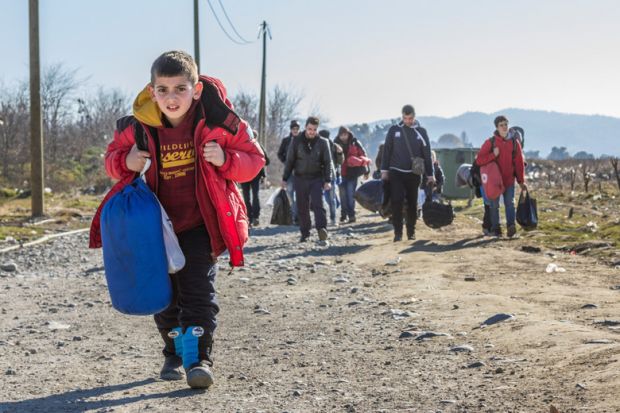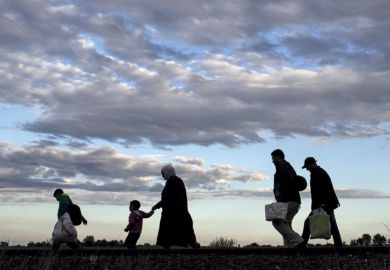Ahmad Abd Rabuh had two options after he completed his master’s at the University of Qatar last year: return to his home country of Syria, where he might be assassinated or forced to join the military, or apply for a PhD at an institution in Europe or North America. He picked the latter.
Despite being born in Qatar and living there for several years during the uprising in Syria, he said that he was told by the Qatar government that he could not receive citizenship and would have to leave after his graduation. Meanwhile in Syria, his father is “wanted” for protesting against President Bashar al-Assad’s forces; he said that the government has already killed his cousin and arrested his aunt in retaliation, and he feared that he could face the same fate if he returned.
But a new scheme at the University of Portsmouth’s business school enabled Mr Abd Rabuh to come to the UK. The initiative, in partnership with Scholars at Risk and Amnesty International, provided full scholarships for two PhD students from “emerging economies”. Portsmouth has allocated funding for the department to recruit two more scholars next year.
Mr Abd Rabuh, who joined the institution in March this year, said that he “saw a big difference” between how the UK and Qatar treat immigrants.
“I saw that religion and race doesn’t matter here; as long as you are beneficial and working hard, they will always appreciate you,” he said.
“In the UK, I got a student visa easily, and I am eligible for asylum as well. There are no more barriers. This will free my mind and make me more productive when I do research.”
However, he said that the murder of MP Jo Cox last month “was really upsetting” and had inspired him to try even harder to prove the worth of refugees fleeing war and coming to live and work in the UK.
“It gives you a bit of motivation to work harder, and to try to prove that not every refugee is a criminal and we’re not all part of Isis,” he said.
His PhD is in finance and banking, and he said that he hopes to either continue working in academia or to find a job at a firm in a big city such as London, New York or Chicago. Ultimately, however, he wants to return to Syria.
“I want to build back my country so people are safe again and be one of the people founding the new system,” he said.
Panos Kapotas, senior lecturer at the School of Law at Portsmouth Business School and leader of the initiative, said that the scheme does not specifically target refugees but rather students from emerging economies who will then have the potential to implement their research back in their home countries. However, he said he recognised that in many cases it would not be possible for them to return to live there.
Omid Shams is one such case. He said that he was in a “time of despair” before joining Portsmouth Business School through the initiative earlier this year.
As a journalist and political activist in Iran, he was, he said, arrested several times but managed to flee to Denmark with the help of the International Cities of Refuge Network (ICORN), which provides temporary shelter for writers and artists at risk. As the end of his two-year stay approached, he heard about Portsmouth’s scheme.
He said that his research is on mechanisms of indirect censorship, which are usually “untraceable” and involve manipulating and regulating the media to restrict freedom of expression.
Mr Shams said that it would not be possible for him to return to Iran after his studies – the subject matter of his research could put him at even more risk if he goes back, he admitted – but he hopes to work at an international human rights organisation where his research will have an impact on the country.
He added that the most “effective” way that universities can improve their support to refugees is by properly identifying them, or scholars at risk, during the recruitment process.
“Admissions departments can be very bureaucratic, and they don’t always care that a student might be coming from Zimbabwe by boat,” he said.
He added that institutions could also work more closely with other organisations and charities to identify potential refugee students and academics.
The existence of initiatives such as Portsmouth’s need to be communicated better to those in conflict zones, he added. “I would have had no idea that such a programme [at Portsmouth] existed without ICORN.”
European passport for refugees aims to make university admissions ‘much more efficient’
A proposed European qualifications passport for refugees could make it easier for universities across the continent to recruit refugee students and staff.
Terje Mørland, director general of the Norwegian Agency for Quality Assurance in Education (NOKUT), said that although universities in Norway have been proactive at admitting refugee students and academics, it is difficult for them to assess individuals who lack documentation.
“In Norway, all the big higher education institutions have been very eager to work with refugees, they have provided special courses for them, but working with those with no documentation is very time-consuming,” he said.
Earlier this year, NOKUT introduced a pilot project to test a new method for evaluating refugees’ qualifications. It issued passports for refugees that contained information about their highest completed qualification, their work experience and their language proficiency, based on an interview with the applicant.
Mr Mørland said that the organisation, in partnership with UK NARIC, the UK’s national agency responsible for the recognition of international qualifications, has proposed for this to be expanded to a Europe-wide scheme and has presented the initiative to the European Commission, the Council of Europe, the United Nations Educational, Scientific, and Cultural Organisation and other international organisations.
He said that it would make the admissions process for refugees at universities and employers “much more efficient”.
The passport would be valid for three years, he added, saying that such a time limit was important so that “institutions or employers can see the difference between formal, legally binding documents and this passport, [which] is only based on partial documentation and an interview”.
POSTSCRIPT:
Print headline: In ‘despair’ until gift of PhD study offered hope
Register to continue
Why register?
- Registration is free and only takes a moment
- Once registered, you can read 3 articles a month
- Sign up for our newsletter
Subscribe
Or subscribe for unlimited access to:
- Unlimited access to news, views, insights & reviews
- Digital editions
- Digital access to THE’s university and college rankings analysis
Already registered or a current subscriber?








